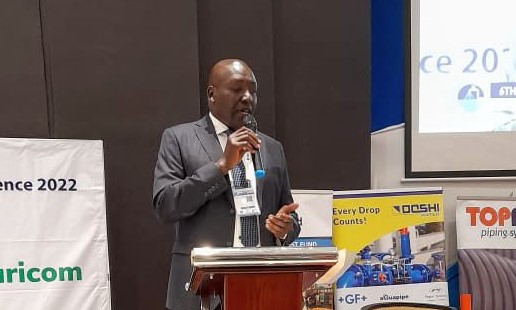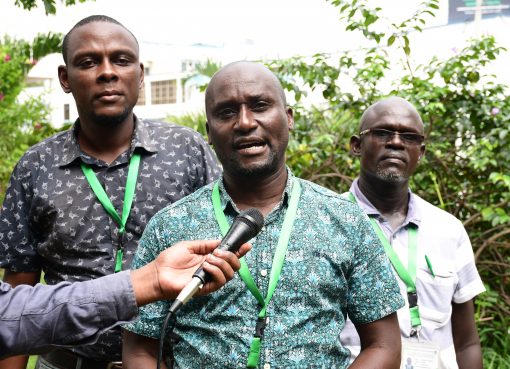The Chief Administrative Secretary for the Ministry of Water, Sanitation and Irrigation Dr. Andrew Tuimur has called upon the Waters Service Providers (WSPs) in the country to embrace the Advanced Metering Infrastructure (AMI) which uses smart meters’ technology to prevent the high levels of Non-Revenue Water (NRW) loss which currently stands at 45 per cent causing the sector to lose more than Sh10.5 billion annually.
Addressing the delegates who had convened at the three day 6th Water Services Providers Association (WASPA) Conference on Water Loss Management held in Eldoret, with the theme of ‘Deployment of Advanced Metering Infrastructure (AMI) in Water Loss Management’, the CAS pointed out that the technology is meant to accelerate the realization of not only the Sustainable Development Goal no. 6 about access to water and decent sanitation but also the Kenya Vision 2030 on the Universal Water Coverage in the country.
Additionally, Tuimur reiterated that the high volume of the water lost could be used to improve water coverage which currently stands at 60 per cent and which is regulated by WSPs.
The CAS led a team of the organizing partners from the Ministry of water, Sanitation and Irrigation, Uasin Gishu County and the Eldoret Water and Sanitation Company (ELDOWAS) and sponsors led by Safaricom PLC, to inspect the adoption of AMI water technology at Chebara Intake Works, Kipkorgot District Metered Area and Kenya Re in Uasin Gishu County.
He lauded the ELDOWAS which was the host WSP in Eldoret, for demonstrating the smart metering technology to curb water losses while at the same time adding that AMI solutions are directed towards management of the commercial losses which greatly contribute to the high levels of Non-Revenue Water which arise due to cases of corruption and illegal practices.
“Commercial Water losses are mainly attributed to meters and human factors. Poor installation of meters, interferences like reversals and by-passes, errors in meter reading and data analysis, malpractices are some of the human factors affecting the effectiveness of a metering system,” said Tuimur.
“The AMI we are introducing now is more effective and efficient. The conventional meters have however improved through automation of meter reading and data transfer, computation and billing processes to produce accurate bills in time and eliminate bills congestion. Automation enables customers to read and pay their bills remotely through payment platforms like Safaricom Mpesa service, this helps improve water utilities’ efficiency which helps reduce non-revenue water loss while at the same time improving revenue collection,” he added.
Tuimur noted that through the WASPA’s three-day conference slated to end on 30th June, the key stakeholders in the water and sanitation industry would be able to share good practices, deliberate challenges and formulate strategies to leverage the AMI systems as a technological solution towards effective management of non-revenue water.
He commended Meru and Nyeri counties who had managed to reduce their non-revenue water loss to less than 20 per cent.
Tuimur pointed out that while transition to AMI is good move for water companies, it also requires financial support for effective and successful implementation of the water technologies in terms of development, procurement, installation and maintenance and upgrading of the infrastructure. He added that, that is addressed through financiers like Water Sector Trust Fund, National Bank and other financial institutions.
He further said with regard to HR development, successful implementation, maintenance and improvement of smart meters require corresponding technical knowledge to handle complexities on configuration of hardware and software adding that existing technical staff need also to be prepared for the transition by embracing the technology and to promote ownership and acceptance to facilitate a smooth and successful transition into the automation.
“Smart Meter Technology is a worthy investment in management of NRW loss which the WSPs should venture into and the county governments should support the water service providers to facilitate the transition since many water companies lack financial support to run. Alternatively, WSPs must also explore other avenue to access finance like commercial bank loans and public private partnerships to leverage on the financial infrastructural development on management of the non-revenue water,” pointed Tuimur.
The CAS pointed out that the national government through the Ministry of Water, Sanitation and Irrigation is keen on supporting all the water service providers through WASPA as it did during the Covid-19 pandemic period.
“As a ministry, we will support the WSPs with the policies, funding through the Water Sector Trust Fund (WTSF), we will support them in every aspect so that we improve water coverage in this country to realize Universal Water Coverage in the year 2030 and improve sanitation for our people. That is why as a ministry we are involved in about 685 small, medium and large water projects in the country like the Kipkaren and Kimumu water projects in Uasin Gishu and many others across the country under the Sustainable Town Water and Sanitation Programme,” explained Tuimur.
Present in the event was the Uasin Gishu Deputy Governor, Daniel Chemno who lauded the organizers led by the Ministry of water, Sanitation and Irrigation and WASPA for coming up with steps to reduce NRW losses and improve revenue collection by the WSPs in the country adding that the county administration of Uasin Gishu in collaboration with ELDOWAS is keen on providing quality and sustainable water services to the residents of Uasin Gishu through AMI technology which had already been adopted.
“We have started pilot programme and the success of digital metering is wonderful, we hope going forward this is the path we want to take, through the AMI, we have been able to identify the leakages, monitor consumer consumption. We have experimental areas in Kipkorgot and it had proved to be a success,” said Chemno.
WASPA chairperson who is also the Mavoko Water and Sanitation Company Managing Director Michael Mangeli said the association is geared towards ensuring reduced non-revenue water which is the main challenge faced by WSPs in the country, by bringing all the stakeholders together holistically like Safaricom to offer technological support, manufacturers of quality water products like TOPPIPE, banks for financial support among others so that a lasting solution to the NRW is found.
In his remarks ELDOWAS Managing Director Peter Biwott during his welcoming address in the WASPA summit, pointed out that the company journeyed into to AMI technology in 2017 after experiencing commercial losses as high as 49 per cent. He added that the company had managed to make commendable steps in reducing commercial losses through smart metering systems with key features to determine storing volumes, consumer daily consumption rate, alarm in case of meter tampering and others.
By Ekuwam Sylvester





